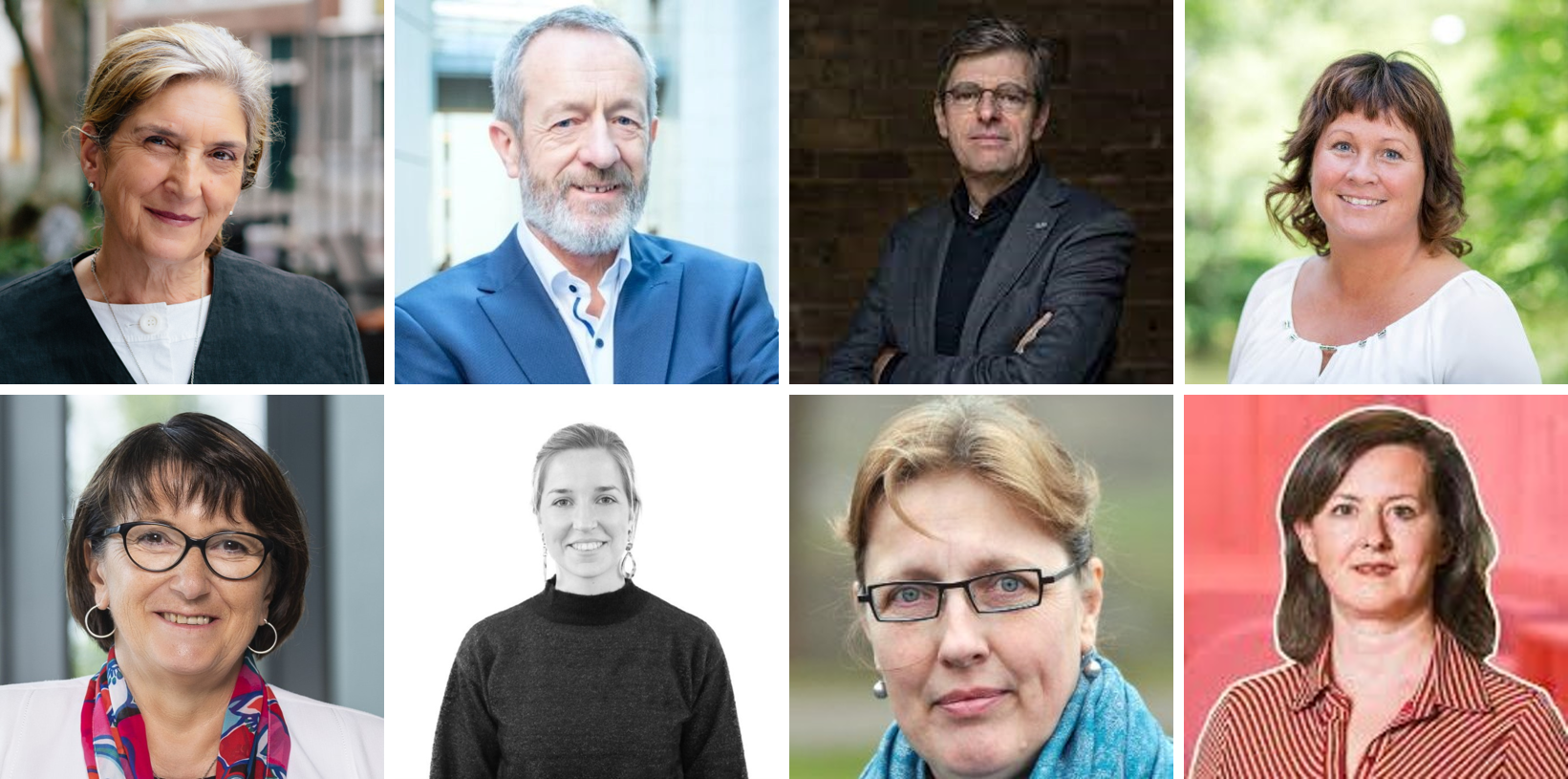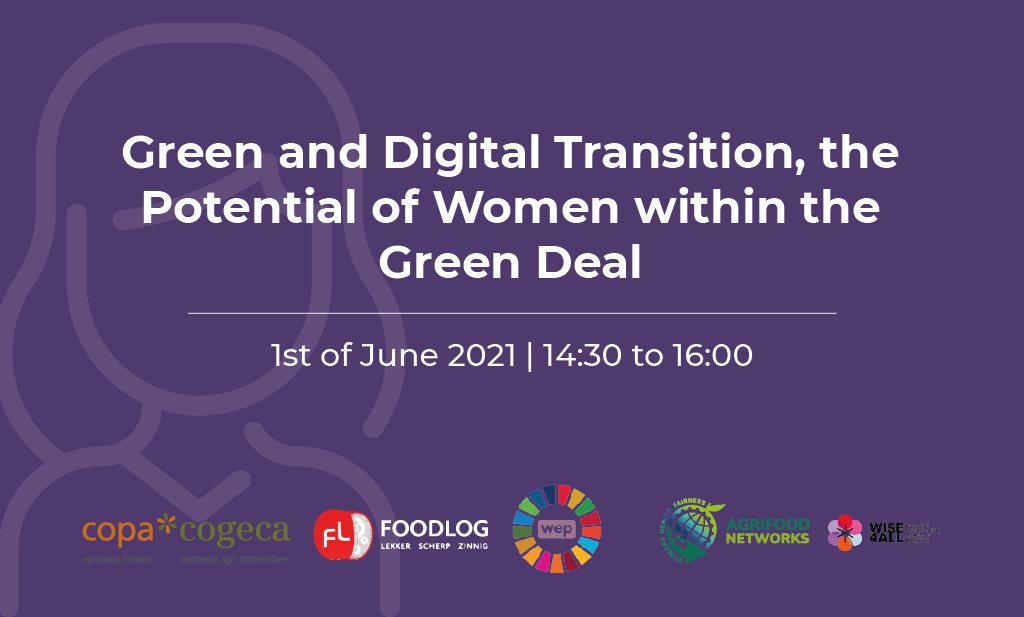Join the conversation Green and digital transition, the potential of women within the Green Deal. The Women Entrepreneurship Platform, Copa Cogeca and AgriFoodNetworks organize an online dialogue about the potential of women within the Green Deal. Join us on Tuesday, 1st June 2021, 14:30 - 16:00 CEST.
“Gender equality is a core principle of the European Union, but it is not yet a reality. In business, politics, and society, we can only reach our full potential if we use all of our talent and diversity. Using only half of the population, half of the ideas or half of the energy is not good enough”, said President of the European Committee Ursula von der Leyen.
Gender Equality Strategy
The Von der Leyen Commission has outlined strong commitments towards a green and digital future; one that involves all European citizens working together leaving no one behind.
The Green Deal, supported by the ambitions set out in the Climate Law, Biodiversity and Farm to Fork Strategy, paves the way for a more sustainable and resilient agricultural sector. Whilst the Gender Equality Strategy published last year, lays out an approach for an equal society for all, with actions to address current inequality in Europe and Internationally.
How can these policy initiatives merge, and place women farmers and rural women at the forefront of the green and digital transition?
In the webinar Green and digital transition, the potential of women within the Green Deal on Tuesday June 1st, we will explore the potential of women within the Green Deal, and the way we can come together to facilitate women as the drivers of green and digital transition in the agricultural sector and rural areas. Over recent years, the number of women working within the industry has slowly been increasing, as well as recognition for the often invisible role they play on family farms. Female-led rural entrepreneurship in activities such as agro-tourism and direct selling has led to improved vibrancy of rural areas as well as new revenue streams for farmers.
However, women are on the bottom rung when it comes to education and training in important digital technologies. Likewise, regarding access to finance, support programmess are currently not reaching innovative women, where only 2% of all initial funding is allocated for women-led start-ups. And while small businesses are the backbone of the economy, and entrepreneurs are recognized as a key source of new, innovative ideas, women represent only about 33% of all entrepreneurs in the EU.
According to the European Commission’s own study (Statistical data on Women entrepreneurs in Europe, 2014): “Women continue to be held back from launching their own companies by a range of barriers including education, stereotypes, lack of confidence and difficulties with access to finance and access to networks. Female creativity and entrepreneurial potential are an under-exploited source of economic growth and new jobs that should be further developed.”
Furthermore, within the Gender Equality Strategy, the Commission highlights that ‘Women and men are not equally affected by green policies tackling climate change’. As we began shaping a greener and digital way of life, it is important that the barriers that are preventing women from participating are overcome and that there are opportunities and enablers to ensure that rural women and those working in rural areas are not left behind.
Improving the quality and accessibility of infrastructure (e.g., broadband), facilities and services (e.g., childcare, elderly care, health care, and schools) for everyday life in rural areas can support women’s innovation and entrepreneurship in agriculture. Agricultural work is such that it entails a seven-day workweek. Government policies for parental leave and sick leave replacement must be in place to cover the farm families’ needs. Policies could also support family members, including women, who may work full-time or part-time on the family farm, sometimes without a social status or legal recognition. This in turn hinders a pension plan, social security, and work accidents insurance. These types of support measures will improve the living standards in rural areas, and the problems of isolation and the rural exodus will be overcome.
It has been said that: “…human creativity is seen as the ultimate economic resource” which is increasingly important to our economic well-being (David Florida, 2002). Rural women need to be encouraged to realize their full potential. In that regard, and to augment the ‘deal flow’ of creative ‘Green Deal’ solutions, it is ‘all hands on deck’, and all the ideas possible are required in these challenging times, both from men and women. Programmes to bridge the gap and level the playing field, to ensure that women in agriculture and rural communities have better access to finance, more training in innovative technologies, and supporting government policies, could make the difference.
Gender Equality Strategy
The Von der Leyen Commission has outlined strong commitments towards a green and digital future; one that involves all European citizens working together leaving no one behind.
The Green Deal, supported by the ambitions set out in the Climate Law, Biodiversity and Farm to Fork Strategy, paves the way for a more sustainable and resilient agricultural sector. Whilst the Gender Equality Strategy published last year, lays out an approach for an equal society for all, with actions to address current inequality in Europe and Internationally.
While small businesses are the backbone of the economy, and entrepreneurs are recognized as a key source of new, innovative ideas, women represent only about 33% of all entrepreneurs in the EUPotential of women
How can these policy initiatives merge, and place women farmers and rural women at the forefront of the green and digital transition?
In the webinar Green and digital transition, the potential of women within the Green Deal on Tuesday June 1st, we will explore the potential of women within the Green Deal, and the way we can come together to facilitate women as the drivers of green and digital transition in the agricultural sector and rural areas. Over recent years, the number of women working within the industry has slowly been increasing, as well as recognition for the often invisible role they play on family farms. Female-led rural entrepreneurship in activities such as agro-tourism and direct selling has led to improved vibrancy of rural areas as well as new revenue streams for farmers.
However, women are on the bottom rung when it comes to education and training in important digital technologies. Likewise, regarding access to finance, support programmess are currently not reaching innovative women, where only 2% of all initial funding is allocated for women-led start-ups. And while small businesses are the backbone of the economy, and entrepreneurs are recognized as a key source of new, innovative ideas, women represent only about 33% of all entrepreneurs in the EU.
According to the European Commission’s own study (Statistical data on Women entrepreneurs in Europe, 2014): “Women continue to be held back from launching their own companies by a range of barriers including education, stereotypes, lack of confidence and difficulties with access to finance and access to networks. Female creativity and entrepreneurial potential are an under-exploited source of economic growth and new jobs that should be further developed.”
Furthermore, within the Gender Equality Strategy, the Commission highlights that ‘Women and men are not equally affected by green policies tackling climate change’. As we began shaping a greener and digital way of life, it is important that the barriers that are preventing women from participating are overcome and that there are opportunities and enablers to ensure that rural women and those working in rural areas are not left behind.
Rural women need to be encouraged to realize their full potentialSupport measures
Improving the quality and accessibility of infrastructure (e.g., broadband), facilities and services (e.g., childcare, elderly care, health care, and schools) for everyday life in rural areas can support women’s innovation and entrepreneurship in agriculture. Agricultural work is such that it entails a seven-day workweek. Government policies for parental leave and sick leave replacement must be in place to cover the farm families’ needs. Policies could also support family members, including women, who may work full-time or part-time on the family farm, sometimes without a social status or legal recognition. This in turn hinders a pension plan, social security, and work accidents insurance. These types of support measures will improve the living standards in rural areas, and the problems of isolation and the rural exodus will be overcome.
It has been said that: “…human creativity is seen as the ultimate economic resource” which is increasingly important to our economic well-being (David Florida, 2002). Rural women need to be encouraged to realize their full potential. In that regard, and to augment the ‘deal flow’ of creative ‘Green Deal’ solutions, it is ‘all hands on deck’, and all the ideas possible are required in these challenging times, both from men and women. Programmes to bridge the gap and level the playing field, to ensure that women in agriculture and rural communities have better access to finance, more training in innovative technologies, and supporting government policies, could make the difference.
Join the conversation

Green and digital transition, the potential of women within the Green Deal, Tuesday 1st June 2021, 14:30 – 16:00 CEST.
We will use Zoom to facilitate the conversation.
Your questions are part of the game. So, join us live!
Registration is no longer possible.
Programme

To delve into this topic, we will be joined by a line-up of speakers, all bringing their own experiences and perspective working within the agricultural sector.
14:30 Opening remarks
Lesia Radeliki, member of cabinet to the Commissioner Helena Dali
14:45 Why is women entrepreneurship back on the agenda, especially in rural areas?
Dick Veerman, Founder of Foodlog (Moderator)
Christiane Lambert, President of FNSEA, and President of Copa
Charlene Lambert, Founding Board Member of WEP
15:00 Examples from the Copa-Cogeca Women farmers Innovation Award
Dr Boglarka Biro, forest engineer and farmer in Hungary
Ines Theunis, livestock farmer in Belgium
15:15 Interactive Roundtable Discussion
Lotta Folkesson, Chairwoman of Copa-Cogeca’s Women's Committee
Froukje de Jong-Krap, farmer in the Netherlands
Dr Margreet van der Burg, senior lecturer and researcher in gender studies/history of food, agricultural and rural research and development, Wageningen University
15:50 Closing remarks
MEP Sean Kelly, member of the Committee on Industry, Research and Energy (ITRE)

Green and digital transition, the potential of women within the Green Deal, Tuesday 1st June 2021, 14:30 – 16:00 CEST.
We will use Zoom to facilitate the conversation.
Your questions are part of the game. So, join us live!
Registration is no longer possible.
Programme

To delve into this topic, we will be joined by a line-up of speakers, all bringing their own experiences and perspective working within the agricultural sector.
14:30 Opening remarks
Lesia Radeliki, member of cabinet to the Commissioner Helena Dali
14:45 Why is women entrepreneurship back on the agenda, especially in rural areas?
Dick Veerman, Founder of Foodlog (Moderator)
Christiane Lambert, President of FNSEA, and President of Copa
Charlene Lambert, Founding Board Member of WEP
15:00 Examples from the Copa-Cogeca Women farmers Innovation Award
Dr Boglarka Biro, forest engineer and farmer in Hungary
Ines Theunis, livestock farmer in Belgium
15:15 Interactive Roundtable Discussion
Lotta Folkesson, Chairwoman of Copa-Cogeca’s Women's Committee
Froukje de Jong-Krap, farmer in the Netherlands
Dr Margreet van der Burg, senior lecturer and researcher in gender studies/history of food, agricultural and rural research and development, Wageningen University
15:50 Closing remarks
MEP Sean Kelly, member of the Committee on Industry, Research and Energy (ITRE)
Photo credits: Photo Dick Veerman: Bas Uterwijk for Foodlog Media




Carolien Makkink You can watch the recording here on our YouTube channel.
Carolien Makkink, the event will be recorded and published here on AgriFoodNetworks.
I don't have time to join the conversation on June 1st. Will it be possible to view a recording afterwards?